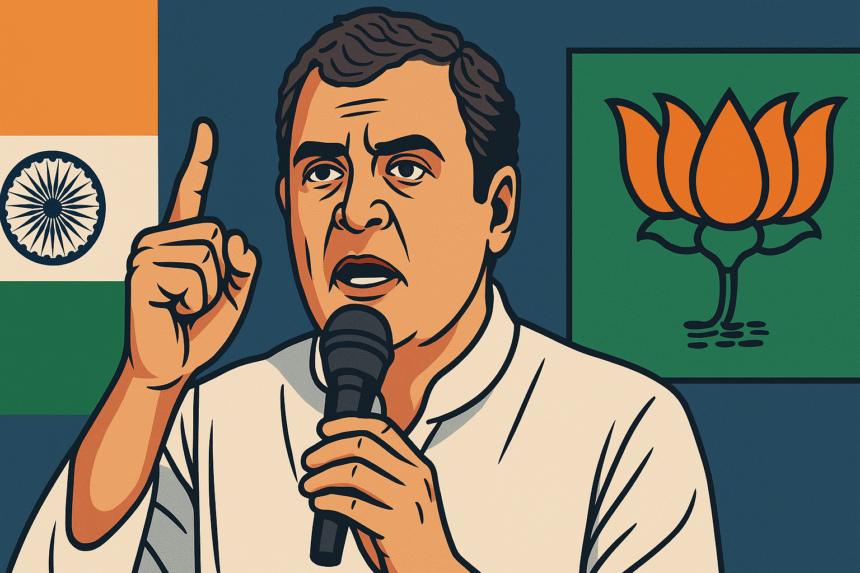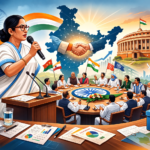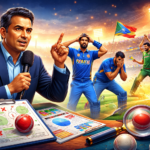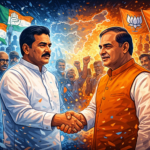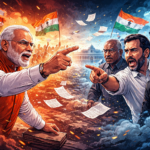Buckle up, politics enthusiasts! Rahul Gandhi has thrown down the gauntlet again, calling out what he calls a blatant act of vote chori—or vote theft—and accusing the Election Commission of being complicit in election rigging. The setting? Another high-stakes battle in political theatre.
- The Allegations: Fake Voters, CCTV Pasts & Myths
- Karnataka Called Out: Fake Names, Anomalies & Numbers
- Maharashtra in the Crosshairs: From Lok Sabha to Assembly Chaos
- Opposition Armed with Data … or Mere Noise?
- Election Commission Responds: “Interesting,” Says Officially
- CEOs Push Back: “Take It Under Oath”
- What Happens Next? Courtrooms, Commissions, or Political Chatter?
- What Makes This Stick? Or Will It Dissolve?
- Final Word: Game On or Game Over?
Here’s what he claimed, why it matters, and what it means for the system going forward.
The Allegations: Fake Voters, CCTV Pasts & Myths
In a fiery press conference, Rahul Gandhi accused the Election Commission (EC) of colluding with the BJP to “steal elections.” He cited:
- A suspicious spike in voter turnout after 5:30 PM
- Denied access to machine-readable voter lists
- Reports of CCTV footage being destroyed
- Claims of around one crore ‘mystery voters’ added overnight
He branded the election results as “stolen,” arguing that this isn’t just flawed—it’s deliberate election rigging dressed up as legality.
Karnataka Called Out: Fake Names, Anomalies & Numbers
Rahul stepped up the drama with eye-catching details. In Karnataka’s Mahadevapura area, he produced electoral rolls and cited suspicious entries—some potentially fake. He accused the EC of hiding behind technicalities, obstructing transparency, and blocking any chance of verification.
This wasn’t just a political statement—it was a challenge to the very credibility of the voting process.
Maharashtra in the Crosshairs: From Lok Sabha to Assembly Chaos
His accusations echo earlier claims tied to the 2024 Maharashtra Assembly elections. He called the results “match-fixed,” saying the margin didn’t reflect public sentiment and suggested voter data had been manipulated in the BJP’s favor.
Rahul argued that genuine anti-incumbency—expected in state elections—was mysteriously absent. He called for audits, data access, and judicial scrutiny to prove it otherwise.
Opposition Armed with Data … or Mere Noise?
Rahul and his team claim internal polling numbers and exit polls show a wide gap between expected outcomes and actual results. They see this statistical mismatch as evidence of vote chori.
But there’s a catch—many of these claims hinge on unverified data that the EC says is not transparent by design. And that’s where skepticism blooms.
Election Commission Responds: “Interesting,” Says Officially
In response, the EC has called these claims “interesting,” neither confirming nor outright denying them. They affirmed that the system followed established procedures for voter list updates and strongly denied the destruction of any essential footage.
Additionally, the Uttar Pradesh CEO fact-checked specific claims about duplicate voter names and found them incorrect. The individuals named were found to be registered only in their original constituency—not multiple ones as alleged.
CEOs Push Back: “Take It Under Oath”
Rather than just issue denials, Chief Electoral Officers from Maharashtra, Karnataka, and Haryana challenged Rahul Gandhi to take it further—under oath.
Only if Rahul was prepared to sign a sworn affidavit, stating that he genuinely believed these anomalies existed, would they move ahead. It’s a political game-changer—makes you wonder if talk alone will suffice or if proof is finally back in fashion.
What Happens Next? Courtrooms, Commissions, or Political Chatter?
With the rhetoric heated, there are a few possible outcomes:
- Judicial Push – The opposition could move to court for a mandate to audit voter lists, polling data, and CCTV archives.
- Media Pressure – The spotlight may force the EC to release partial data or face sustained political embarrassment.
- Public Fallout – If enough voters believe the “vote chori” claims, public trust in the electoral system could erode—fast.
- Systemic Reform – All this could spur real change—better transparency, stronger tech, or stricter oversight.
What Makes This Stick? Or Will It Dissolve?
Let’s be real—allegations alone don’t change election outcomes. But when claims come wrapped in data suspicions, denied access, and destroyed evidence, they sound real. Add emotional phrases like “match-fixing,” “one crore fake voters,” and “vote chori,” and you’ve got political fireworks.
The ball now lies in the EC’s court. Their credibility depends on how they respond—silence could be interpreted as compliance. A detailed report? That could restore public faith.
Final Word: Game On or Game Over?
Rahul Gandhi’s new salvo puts vote chori and election rigging back in headlines. The real question: will this be political noise or spark real electoral checks?
India’s democracy thrives on trust. If that trust cracks, election rigging stops being drama and starts becoming a real threat.
It’s not over yet—and whichever way this goes, it’s going to be tense.





